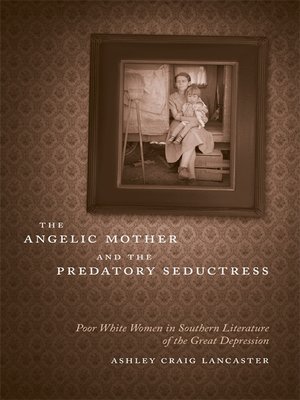The Angelic Mother and the Predatory Seductress
ebook ∣ Poor White Women in Southern Literature of the Great Depression · Southern Literary Studies
By Ashley Craig Lancaster

Sign up to save your library
With an OverDrive account, you can save your favorite libraries for at-a-glance information about availability. Find out more about OverDrive accounts.
Find this title in Libby, the library reading app by OverDrive.



Search for a digital library with this title
Title found at these libraries:
| Library Name | Distance |
|---|---|
| Loading... |
In The Angelic Mother and the Predatory Seductress, Ashley Craig Lancaster examines how converging political and cultural movements helped to create dualistic images of southern poor white female characters in Depression-era literature. While other studies address the familial and labor issues that challenged female literary characters during the 1930s, Lancaster focuses on how the evolving eugenics movement reinforced the dichotomy of altruistic maternal figures and destructive sexual deviants.
According to Lancaster, these binary stereotypes became a new analogy for hope and despair in America's future and were well utilized by Depression-era politicians and authors to stabilize the country's economic decline. As a result, the complexity of women's lives was often overlooked in favor of stock characters incapable of individuality.
Lancaster studies a variety of works, including those by male authors William Faulkner, Erskine Caldwell, and John Steinbeck, as well as female novelists Mary Heaton Vorse, Myra Page, Grace Lumpkin, and Olive Tilford Dargan. She identifies female stereotypes in classics such as To Kill a Mockingbird and in the work of later writers Dorothy Allison and Rick Bragg, who embrace and share in a poor white background.
The Angelic Mother and the Predatory Seductress reveals that these literary stereotypes continue to influence not only society's perception of poor white southern women but also women's perception of themselves.







